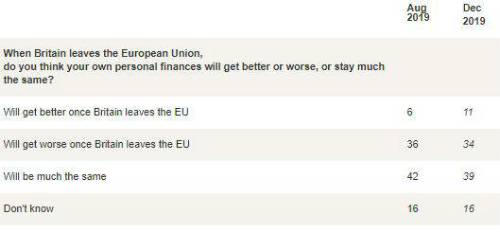The level of pessimism about the impact of Brexit on personal finances declined slightly in the last quarter, from 36 per cent of people who believe their finances will worsen after Brexit in September, down to 34 per cent in December 2019, according to the survey by YouGov on behalf of Royal London, the mutual insurer. There are now three pessimists for every optimist, compared with six pessimists for every optimist in summer last year.
The most commonly held view, shared by nearly two in five (39 per cent) Brits, continues to be that household finances will remain the same. This proportion has remained largely consistent since the quarterly ‘Brexit and personal finances’ survey began just over a year ago.

Just over a third (34 per cent) of people believe they will be worse off post-Brexit. This belief rises to nearly two thirds - 64 per cent - of those who voted Remain, just 1 per cent of whom expect an improvement.
Among Leave voters, 22 per cent expect to see an improvement in their household finances after Brexit, compared with 7 per cent who expect a decline.
A far higher proportion of Leave voters expect their finances will stay the same than Remain voters: 59 per cent of those who voted Leave expect no change in their personal finances, compared with 23 per cent of Remainers.
Top of the list of reasons that those who expect an improvement in their personal finances gave were: an increase in the value of the Pound, a fall in the cost of food and an increase in income.
Among those who expect a decline in their personal finances, the main reasons were, conversely: a fall in the value of the Pound, a rise in the cost of food and a rise in the cost of energy. This continues to highlight a prevailing division in perspectives across the UK, despite a net increase in optimism.
Becky O’Connor, personal finance specialist at Royal London, said: “Most Brits continue to think that Brexit will not have much impact on their personal finances. Despite a near doubling in the proportion of the population who are optimistic, from 6 per cent to 11 per cent in the most recent quarter - the most optimistic level so far, there remains significantly more pessimism than optimism overall.
“The only thing that can end this ongoing uncertainty about the impact of Brexit on the nation’s fortunes, as well as the stark divisions in expectations, is Brexit itself.”
|

